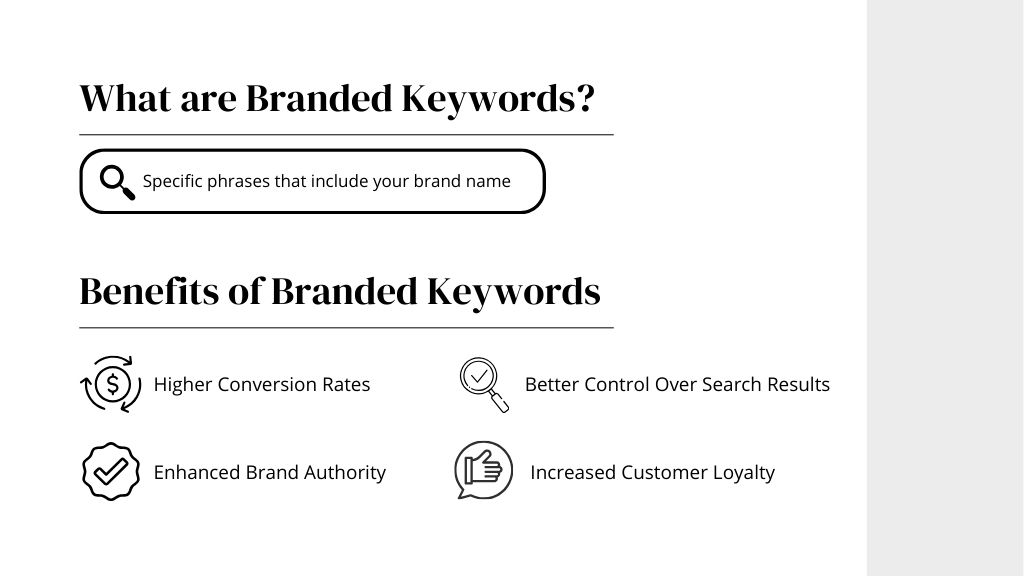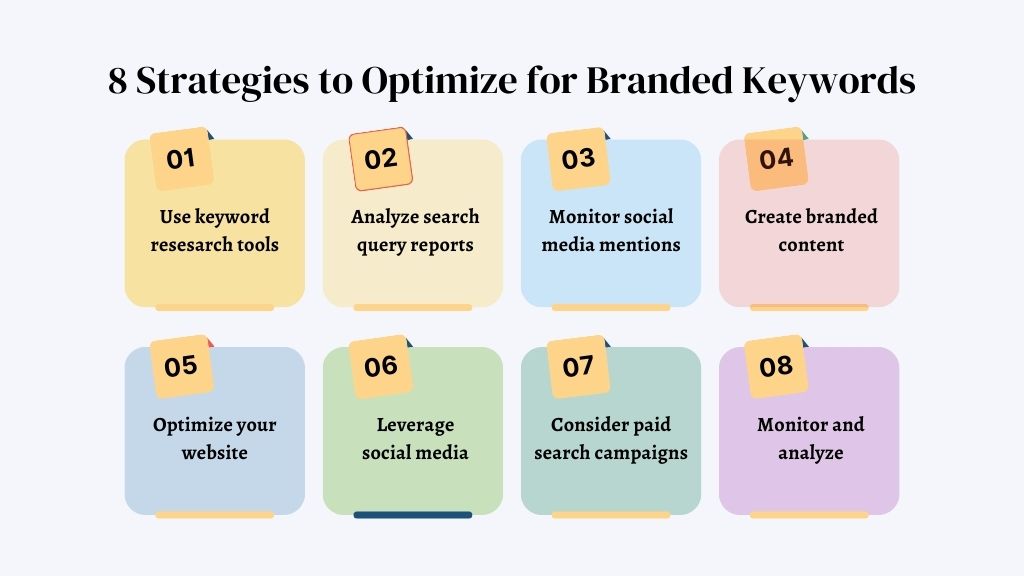8 Ways to Master Branded Keywords for SEO Success

In the world of SEO, branded keywords are an essential component of any successful strategy. Branded keywords are search terms that include your brand name or variations of it.
Mastering branded keywords can significantly boost your online presence, drive more traffic to your site, and strengthen your brand’s authority. Here’s everything you need to know to leverage branded keywords effectively for SEO success.
In this article:
- What are Branded Keywords?
- Benefits of Optimizing for Branded Keywords
- 8 Strategies to Optimize for Branded Keywords
- 3 Common Branded Keyword Mistakes to Avoid
What are Branded Keywords?
Branded keywords are specific phrases that include your brand name. For example, if your brand is “Link Genius,” branded keywords might include “Link Genius software,” “Link Genius outreach tool,” or “How can Link Genius help me with link building.”
Branded keywords are crucial because they help customers find your specific products or services quickly. They also help in building brand loyalty and recognition. When people search for your brand, it shows they are familiar with it and are likely to convert.
Benefits of Optimizing for Branded Keywords
1. Higher Conversion Rates
People searching for branded keywords are usually already interested in your products or services. This means they are more likely to make a purchase or take a desired action, resulting in higher conversion rates.
2. Enhanced Brand Authority
When your brand appears prominently in search results for branded keywords, it reinforces your authority, credibility, and keyword relevance. This helps establish trust with your audience.
3. Better Control Over Search Results
By optimizing for branded keywords, you can better control what information appears in search results. This allows you to manage your online reputation effectively.
4. Increased Customer Loyalty
Customers who frequently search for your brand are more likely to become repeat customers. Optimizing for branded keywords keeps you at the forefront of their minds, encouraging loyalty.

8 Strategies to Optimize for Branded Keywords
1. Use Keyword Research Tools
Tools like Google Keyword Planner, Ahrefs, and SEMrush can help you identify which branded keywords people are searching for. These tools provide data on search volume, competition, and related keywords.
2. Analyze Search Query Reports
Google Search Console offers valuable insights into the search queries that lead to your website. Look for queries that include your brand name to identify potential branded keywords.
3. Monitor Social Media Mentions
Use social media listening tools to track mentions of your brand across different platforms, including co-citations. This can help you discover commonly used branded keywords and phrases.
4. Create Branded Content
Write blog posts that focus on your branded keywords. For example, if your brand is “GreenTech,” you could write articles like “Why Choose GreenTech for Your Energy Needs” or “Customer Reviews of GreenTech Products.”
You can also share case studies and customer testimonials that highlight your brand. This not only boosts your credibility but also naturally incorporates branded keywords.
5. Optimize Your Website
Ensure that your branded keywords are included in key on-page elements such as title tags, meta descriptions, headers, and body content. As you see on our homepage, we incorporate Link Genius from the page title to the footer.
6. Leverage Social Media
Maintain consistent branding across all your social media profiles. Use your branded keywords in your bio, posts, and hashtags to increase online visibility.
Don’t forget to interact with your audience by responding to comments and messages. Use your branded keywords naturally in your responses to increase their prevalence.
7. Consider Paid Search Campaigns
Run pay-per-click (PPC) campaigns targeting your branded keywords. This ensures that your brand appears at the top of search results, driving more traffic to your site.
To ensure the success of your paid campaigns, continually monitor and adjust your ad copy, targeting, and bids to maximize ROI. By investing in branded keyword PPC campaigns, you can capture high-intent traffic and reinforce your brand’s visibility.
8. Monitor and Analyze Performance
Use SEO tools to track the rankings of your branded keywords. Monitor any changes and adjust your strategy accordingly.
Top metrics to track include:
- Organic traffic driven by branded keywords
- Keyword ranking positions
- Click-through rates for branded terms
By analyzing these metrics, you can fine-tune your SEO strategy to further optimize for branded keywords and improve overall performance.
Additionally, pay attention to user engagement metrics such as bounce rate, time on site, and conversion rates for visitors who land on your site through branded keywords. This data will provide valuable insights into the effectiveness of your branded keyword optimization efforts.

3 Common Branded Keyword Mistakes to Avoid
Ignoring Negative Keywords
Negative keywords are terms that you don’t want your ads to show up for. Make sure to identify and exclude any negative keywords that might be associated with your brand but are irrelevant or damaging.
Examples of negative keywords are:
- “Free”: If you don’t offer free products or services, you don’t want to attract users looking for freebies. For example, “GreenTech free products” could attract traffic that won’t convert.
- “Cheap”: If your brand positions itself as a premium option, you don’t want to show up for searches including “cheap.” For instance, “cheap GreenTech solutions” could mislead potential customers about your pricing.
- “Review”: Sometimes, people searching for reviews are not ready to buy. While reviews are important, you might want to exclude this keyword from your paid campaigns to focus on users with higher purchase intent.
- “Jobs”: If someone is looking for employment opportunities, they might type in “GreenTech jobs.” Unless you’re specifically advertising job openings, this keyword could waste your ad budget.
- “Complaint”: Words like “complaint” or “problem” can attract users looking for negative information about your brand, which might not be useful for your campaigns. For example, “GreenTech complaints” is not a search term you would typically want to target.
Overlooking Local SEO
If your business has a physical location, don’t forget to optimize for local SEO. Include your brand name along with local keywords to attract nearby customers. For instance, if you have a coffee shop named Morning Beans in New York City, consider optimizing for branded keywords related to your specific location, such as “Morning Beans New York.”
You should also claim your Google Business listing and encourage customers to give positive reviews, as well as optimize for Google Maps, Local Pack, and Local Finder. This way, you can boost your online visibility within your local community.
Neglecting Mobile Optimization
Ensure your website is mobile-friendly. Many users search for branded keywords on their mobile devices, so a mobile-optimized site is crucial for capturing this traffic. You can do this by ensuring responsive design, fast loading times, and easy navigation on smartphones and tablets. Mobile optimization is not only important for user experience but also for SEO, as search engines prioritize mobile-friendly websites in their rankings.
Boosting Brand Awareness
By understanding their importance and implementing effective strategies, you can enhance your online presence, drive more traffic, and build a loyal customer base. Focus on creating high-quality branded content and the optimization strategies we mentioned above to stay ahead in the competitive digital landscape.
Effective link-building for your branded keywords can take your brand to the next level. Link Genius offers the tools to help you maximize your brand’s visibility through targeted outreach and comprehensive SEO solutions.
Register today and start mastering branded keywords to drive your SEO success!
